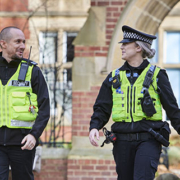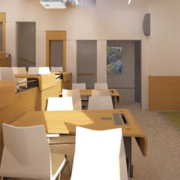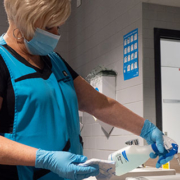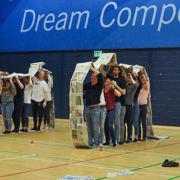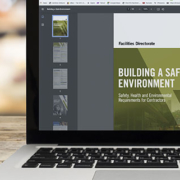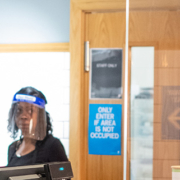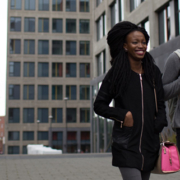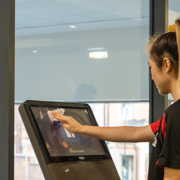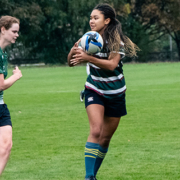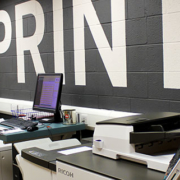Reopening campus and creating future opportunities
Estates and Facilities played a critical role not only in the reopening of the University, but also in providing reassurance to staff and students during their return to life on campus.
Throughout, the team ensured staff and students were confident that they were returning to a safe, healthy, hygienic and well managed environment.
To achieve this, a programme of measures was created which instilled confidence in all staff and reassured them that their health and wellbeing was at the forefront during the pandemic period, with many efforts made to continually invest in the teams.
The measures put in place across the Service included:
Increased training in the Cleaning Service, conflict resolution training for the Security Service and online mental health awareness training took place. Continued training to ensure everyone works to the best of their ability was delivered through running more sessions with fewer numbers, video training and a socially distanced away day in the Security and Facilities team before the start of term.
Cleaning staff received new uniforms to present a more professional image and improve staff moral. New cleaning materials were extensively trialled with the team, ensuring they were safe, sustainable and easy to use. Streamlined colour coding of cleaning equipment took place which made it easier to use and had better laundering qualities. Additionally, new equipment and clear and concise Standard Operating Procedures, to ensure all staff understood their role and standards were consistent, greatly assisted productivity.
Celebrating success and the commitment of staff took place through an end of year celebration with Cleaning Services. A letter of personal thanks from the University Vice-Chancellor to all staff in the Service highlighted the value of each member of staff.
In Security Services, process improvements were made, removing paper-based processes and introducing digital ways of working to reduce touch points. For example, radio and equipment sign in and out was introduced in Security Services using QR codes. A staff survey in Security Services was undertaken to ensure staff voices and opinions were being heard and for staff to feel they could suggest improvements or better ways of working.
Throughout the work of the Service, a collaborative approach was adopted with other key partners who are there to support staff, including our Trade Union colleagues.
As the country began to emerge out of lockdown the Estates and Facilities Service gave exceptional support during the re-opening of campus buildings.
During this period, all buildings were subject to strict re-entry protocols including a full building clean, provision of hand hygiene consumables such as gel dispensers, cleaning stations, improved signage, and a significantly increased service level agreement. At all times staff demonstrated their complete flexibility about where they worked alongside many staff who changed their hours or condensed their working time to not only support the task of re-entry cleaning but to contribute to us having safe numbers of people on campus at any one time. Furthermore, the commitment from the staff has been pivotal in the running of Asymptomatic Testing Centres, and the continued operation of critical study space such as libraries and IT clusters has been phenomenal.
The preparation of teaching spaces in time for September 2020, involved a large scale turnaround, over 400 rooms were surveyed by the Estates and Safety team, resulting in over 190 COVID 19 secure classrooms being prepared for face-to-face teaching. Stringent safety checks were in place to ensure seating configuration met with social distancing arrangements, access and egress was easy to follow, teaching lecterns and facilities were safe to use, cleaning stations were provided in every room for use on touchpoints. A 3D campus model showing the set-up of teaching spaces in their original format and Covid 19 secure layout, provided a view on exactly how much teaching space was required to be re-opened. It also allowed the team to zoom into individual spaces to see a 360-degree photograph of the layout and safety arrangements.
Security Services were instrumental in showing their agility and flexibility to adapt and provide some of their services in a different way. Maintaining their own safety, along with the safety of others, when called to the scene of an incident has required increased provision of Personal Protective Equipment and a regular review of operating practices. The pandemic has created a heightened sense of emotion and anxiety which can sometimes lead to conflict situations. Security Services staff were supported to effectively resolve conflict through a dedicated resolution training session which proved to be hugely beneficial and has helped the team to better understand and view how their actions are perceived by others when handling conflict. Conflict is often a difficult part of the Security Services job and can range from large student gatherings to a criminal offence being committed on campus. The training has helped our team to deliver their role with confidence, but also with an awareness of how they come across to students, staff, and customers.
The return to campus has also opened up significant opportunities to plan for continuous improvement that may have been more difficult or taken longer to achieve prior to the pandemic happening in 2020. Examples of such include:
- Estates and Facilities working closely on the provision of Professional Services hubs to meet the requirements of a blended return to work.
- A single network of teaching space, and the role of the Service in the University-wide Education Spaces Programme to plan for the transformation of teaching space in line with digital transformation and quality standards.
- Further capital investment into teaching spaces, increasing the provision of collaborative lecture theatres, in addition to further investment into innovative multi-mode / hybrid teaching models.
- The realignment of Security, Facilities and Locking on a permanent basis, ensuring customer service is efficient, seamless and flexible.
- Ambition for the Cleaning Service to become a BICS accredited centre.
- Securing the funding required to make the increases to Cleaning Services permanent.
- A better focus on housekeeping and facilities services in areas and times of high occupancy.
- Plans for “flow cleaning” methodology.
- Increasing the scope of certification in Customer Service Excellence in other areas including the Estates Helpdesk, Office Support and Car Parking operations.
The teams within Estates and Facilities will continue to play a pivotal role, not only in the continued requirement to maintain and keep campus safe but in the provision of front-line customer service as learning, teaching and work is transformed.


